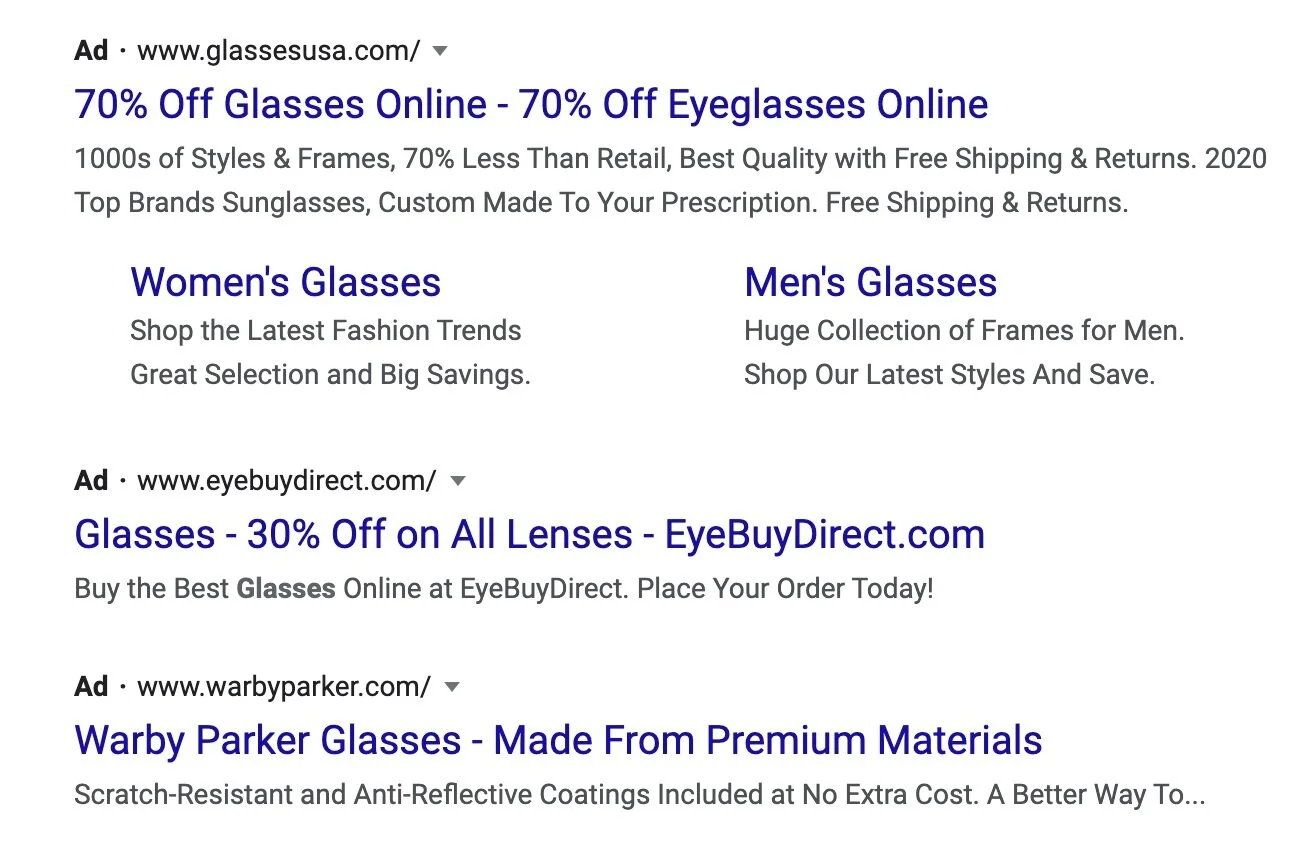A Conversation with Katya Ryabova: Getting Started with Google Ads
/Meet Google ads specialist katya ryabova
This is the seventh post in the “A Conversation With” series, where I interview talented folks about their areas of expertise, whether that’s marketing or advertising. You can read past entries in the series here.
This month, I interviewed Katya Ryabova, owner and founder of SMM Headquarters, based in Toronto. We discussed who should be using Google Ads, how to get started with them, and other best practices. I hope you enjoy her insights!
Tell me about your career path and experience in digital marketing.
In university, I studied sociology, and afterwards, I went to work for a small online company that rented apartments in Europe to travelers. I learned about digital marketing and social media as the platforms all rolled out their own versions of advertising. I transitioned to freelance copywriting for a bit, then eventually started my own agency in 2017 focused on social media marketing. Now my focus is paid media with a specialization in Google Ads.
What aspects of digital marketing does a business need as a foundation for getting started with Google Ads?
You need a website, first of all, and you need to know what kind of tracking you want to do for website visitors. Make sure all your tracking codes are in one place and are crystal clear. Conversions are important to set up if you’re an online business; it adds a lot of value to ad campaigns that you run. Engaging a web developer helps make sure these things are set up in a way that makes sense for the business.
One thing to keep in mind if you’re privacy/ethics minded is that Google collects a LOT of data on your customers. You may not want to use Google Analytics and Google Ads if that’s a concern for you. It’s very effective, though, so it’s a trade off.
What kinds of businesses benefit most from Google Ad campaigns?
Businesses offering a specific product or service that can easily be described in a couple words would benefit from a Google Ads campaign. A specialized product or service is better positioned than an agency with services a lot of people offer, since those are more competitive. If you’re small and unique, Google Ads can be great.
A restaurant may not be a good fit for Google Ads because people don’t typically discover new restaurants while typing a query into search. They look at Google Maps, lists, and articles. A restaurant’s efforts are better spent elsewhere.
It’s important to remember that you won’t get results right away. You have to test it. No matter how well you know your business, there’s always something you haven’t thought about with keywords and searches. If your campaign is vague, you won’t get clicks. It’s a lot of trial and error.
What are some good reasons to launch a Google Ad campaign?
One thing is if a business wants more traffic- more brand awareness, more people to discover their product or service faster. It can be a shortcut (but not a substitute) for SEO. Even great content takes a long time to get indexed by Google. A Google Ads campaign can boost traffic.
Another reason is to generate leads- but I’d caution business owners that the budget drain can be significant if you don’t know what you’re doing. Remember, the number of clicks isn’t as important as the quality of the leads.
Walk me through the main types of Google Ads.
Video Ads - These are the ads you see on YouTube. They’re more for bigger companies, mostly because of the need to produce a catchy video ad. Production value is important and closed captioning is required. If you have a quality video, you can run a video ad for not much more than a search ad costs. It can run both on and off YouTube.
Search - This is when your ad gets shown to people who enter a specific search into Google.
Display - These are the targeted ads that follow you around the internet as banners that appear on partner websites.
An example of search ads for glasses
How does the auction aspect of Google Ads work with setting bids and budgets?
Google tries to push you towards automating your bids. For beginners, I’d recommend going with that. There are so many settings that can add too much complexity to the campaign when no complexity is required.
For new accounts, Google doesn’t have any history of ads running and people clicking, so they don’t have anything to base the bid on. It’s better to set it to be automatic, then all you need to do is set your budget for the day. Google optimizes that based on what they know about all of us. As you get clicks and conversions, Google learns what sorts of people click on ads that result in conversions, and the algorithm gets better and more efficient over time.
The more keywords you have, the better it is to leave the bidding automatic. You can set limits for the auction, saying it shouldn’t cost more than X. Sometimes that strategy is detrimental, because some keywords are more expensive and others are very cheap. If you set those limits, you won’t get the benefit of that “expensive” keyword. And, if your bid is too low, they won’t show your ad, even if it’s a high quality ad.
What tactics have you found most effective in running Google Ads?
If I had to choose one, I’d say negative keywords. You can create whole negative keyword lists that you can save in your account. They don’t have to be campaign-specific. These are like stop words. If you apply a negative keyword to your campaign, any keyword that’s a negative on your list won’t get matched to your ad.
For example, if you sell prescription glasses, and you run an ad for glasses, that could include wine glasses or whiskey glasses. If you enter “wine, whiskey, drinking, water” into your negative keyword list, those won’t be matched to your ad. By elimination, it will only be shown to the most relevant audience. Some negative keywords are pretty universal- like free, cheap, discount, and coupon code. For most of my clients, they’re not giving out discounts and wouldn’t want to include those keywords.
What are some common mistakes businesses make with Google Ads?
Not specifying negative keywords.
Not specifying an end date to your campaign. Google buries that setting, so it can be hard to find. If you don’t specify an end date, it will run indefinitely until you turn it off. This is important for small businesses- owners are busy and might miss this and spend a lot of money.
Making your copy too general.
Not using longtail keywords. For example, an ad for “prescription glasses east end toronto” will likely perform better than “glasses” because it’s way more specific.
Running only one version of the ad. It’s always good to have at least two. I recommend three. See which one gets the most clicks, impressions, and conversions.
Don’t use your website’s home page as the landing page for the campaign. It’s better to create a specific landing page that speaks to what you promise in the ad. The more specific the ad, the more specific the landing page. It’s best to provide minimal text because people don’t read. It needs to be catchy, answer the question, and provide a specific call to action of what you want them to do. Don’t be shy! Have them call you or fill out a form. If it’s a form, the shorter the better.
The copy for Google Ads has to be pretty short. What are your best tips for writing concise, compelling copy?
Prepare to spend some time trying to fit into the character limit. You’ll have to play with wording and sacrifice a punctuation mark or two. The limit is 30 characters, so you have to be precise. Prioritize your most important keywords and infuse some personality! Always be clear.
A concise ad for cat sweaters
What’s a “good” cost per click?
It depends on what you’re after. Say you have an ecommerce website that sells swimwear and you know that the average visitor who makes a purchase spends $45 on average. Each conversion brings you approximately $15 in pure profit. It doesn’t make sense for you to pay even $5 a click. You’re $10 ahead, but you’re more interested in quantity. The more visitors you get for the lowest price possible, the more conversions you’ll potentially get. Keep in mind that not every click will convert. $5/click and a high conversion rate, say 10%, then you’re paying $5 per visitor, but maybe only one out of every ten converts. You spent $50 on those 10 visitors, and one converts, and your profit is $20, that’s not worth it. Conversion rate is very important. You need to know how many convert. If you’re a new business, you might not have enough data, but this comes with time. It’s also important to keep in mind that Google Ads should not be your only marketing tactic.
Here’s another example: you run a specialized consultancy for finance CEOs looking to change careers. You’re highly specialized and working with individuals with high budgets. You might not even get 10 clients a year, but the value of each client could be hundreds of thousands of dollars. You’re not interested in 1,000 clicks coming to your website every day. You’re interested in one qualified lead per month that could yield you a contract of $50,000. What is the click worth to you? It’s more than $5. It’s probably more like $200. You could spend up to $5,000 on ads, and if they yield you one lead that results in a profit of $50,000, that’s worth it. You can spend more money and not be as concerned about the number of clicks, as long as it still results in profit.
What other digital marketing tactics pair well with Google Ads?
Investing in your website is a must. Optimize it, make sure it loads fast and is user friendly and interesting. Content marketing is a big one as well, you need to give users something to do on your website if they’re not ready to buy. Give them a newsletter to sign up for and a blog to read. Investing in SEO is worthwhile too.
Any final thoughts?
It’s fine to try Google Ads yourself and throw $5 a day at it and see what happens! If you want to make it one of your main marketing channels, invest the money into working with a specialist who can make it work for you to help your business grow. Knowing your business type and target audience and making those two connect through Google Ads is no small feat!
Where can people find you?
I write about Google Ads a lot these days on the SMMHQ blog. You can also follow me on Twitter.
For more marketing insights, check out my unboring email newsletter.





